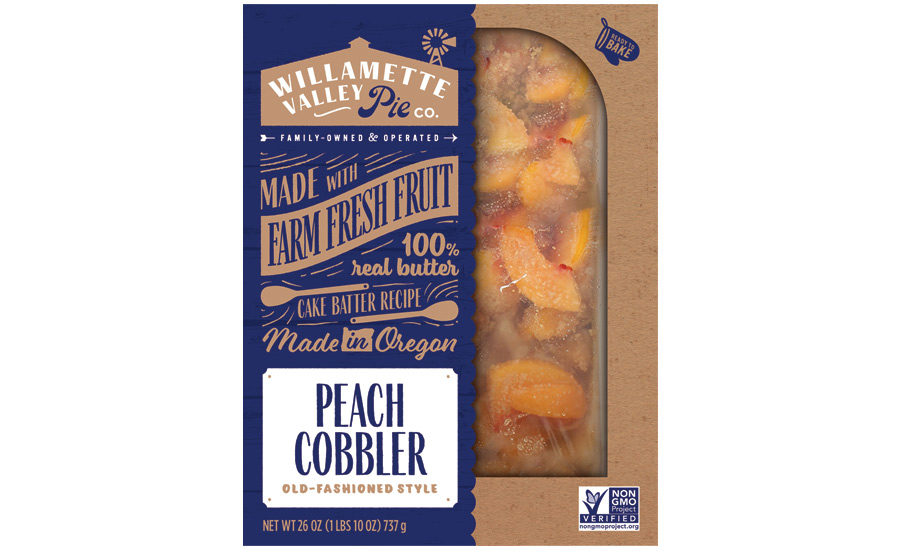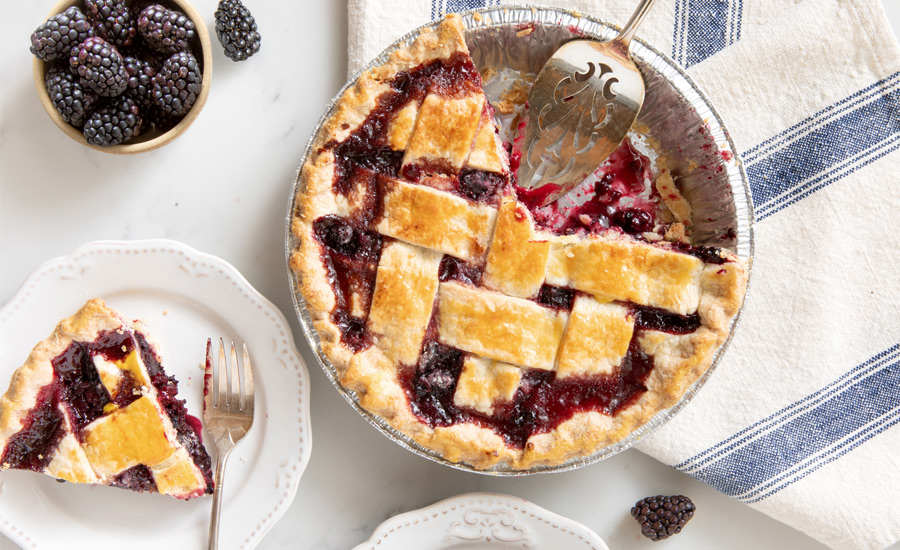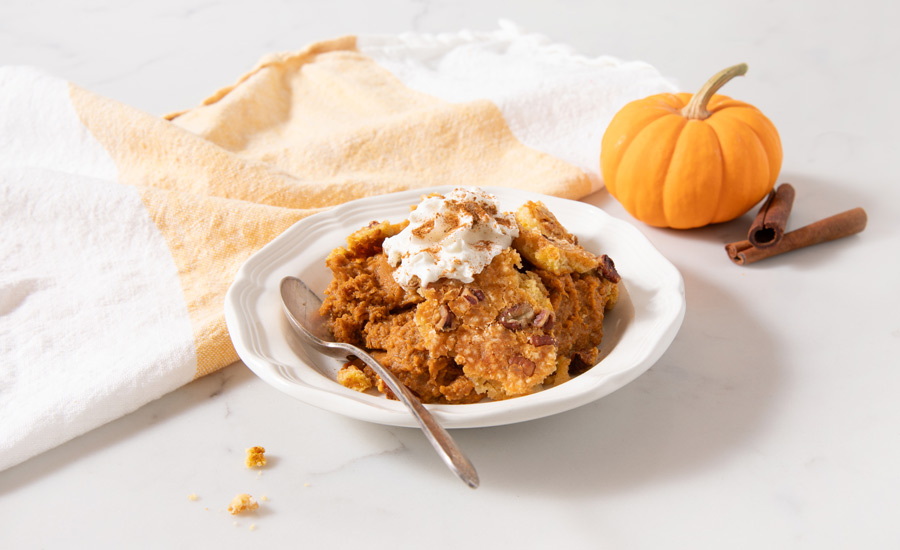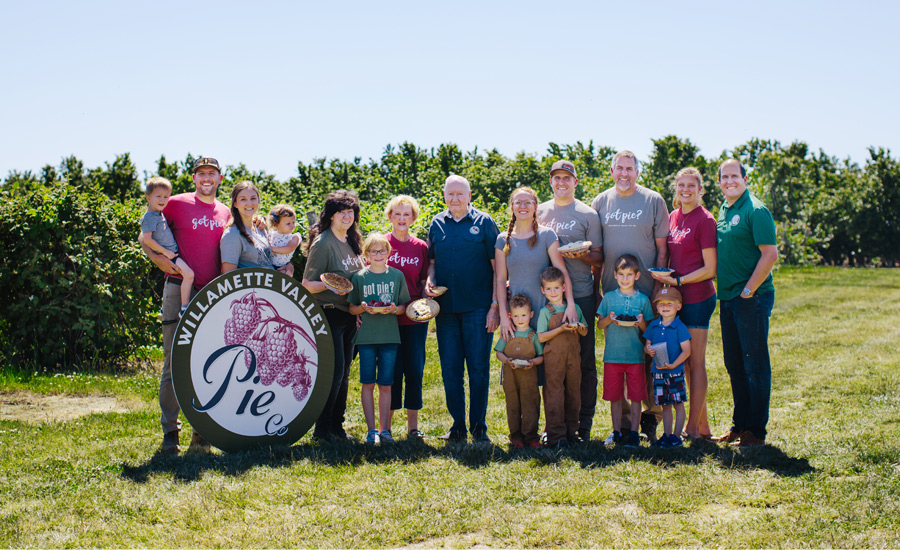Pies appeal to millennials, families with differentiated portion sizes
March 19, 2024
Pies appeal to millennials, families with differentiated portion sizes
March 19, 2024Courtesy of Edwards Desserts
The Bottom Line:
- The pie category has increased in sales
- Single-serving pies are more common
- Producers are tracking flavor, ingredient trends
The making or buying of a pie used to signal that company was coming over—or at the very least that a family would soon be sharing the dessert. Nowadays, however, pie consumers are bucking that trend, and single-serving pies are also becoming more prevalent.
Market data
Per Chicago-based market research firm Circana’s data from the 52-week period ending January 28, the “center store pies” category increased by 7.1% from the same time period last year, with $447.1 million in overall sales.
The “center store individual/snack pies” subcategory brought in the majority of the total sales, with $429.9 million, an increase of 5.4% from last year. Private label snagged the largest piece of that pie—no pun intended—with $119.9 million in sales, and a notable 33.1% increase in sales. McKee Foods Corp. took in $76.3 million, with an 11.8% increase, and JTM Foods Inc., coming in third, garnered $69.4 million, with a modest 3.8% uptick in sales.
The “center store whole pies” subcategory accounted for $16 million of the total sales, with a huge 104.1% uptick in sales from the same time period last year. Private label again led the pack, with $11.4 million in sales and a 124.2% increase, with Flowers Foods bringing in $965,500 with a massive 362.7% increase. Interestingly, Dearborn Market, a Michigan brand, brought in $951,600 in pie sales, with an increase of 14%.
The subcategory of “center store tarts” accrued $1.2 million in sales, but experienced a drastic 40.4% decrease in sales from the year before. Acadian Bakery accrued $618,000 of that, with almost no change (+ 0.3% increase), and Daisy Bakery Inc. took in $279,100 in sales, with 10.8% increase. Brooklyn Delights made $190,500 in sales, with a gigantic 387.6% jump in sales.
Moving to the “perimeter pies” category, the category took in $1.18 billion in sales this past year, with a 2.4% increase. Private label again found its stride, with $850.2 billion of that total number, and a 1.8% increase in sales. Four B Corp. made $34.2 million in sales, with a 4.3% increase, and Jessie Lord Bakery LLC brought in $32.4 million, with a 2.9% increase.
Looking for a reprint of this article?
From high-res PDFs to custom plaques, order your copy today!
The “AO [All Other] perimeter pies” subcategory took in $165.3 million, with an 8% increase, and private label accounted for $110.2 billion of that number, with a small 1.9% decrease in sales. Pattis Good Life Inc. took in $32.98 million in sales, with a nice 20.3% increase, and Hubigs Pies accrued $11.6 million, with a drastic 941.8% increase.
“Perimeter tarts,” another subcategory, took in $97 million and experienced a 1.1% decrease in sales, private label accounted for $86.8 million, with almost no change (0.1%), and Mondelēz International was responsible for $4.1 million of that number, but experienced an 18.7% decrease in sales. Third in the subcategory was Ukrops Homestyle Foods LLC, bringing in $1.55 million, with a 26.2% increase in sales.
In addition, the “perimeter individual/snack pies” subcategory was up 1.8%, coming in at $63.9 million. Top companies included Table Top Pies ($34.1 million, +6.3% in sales); private label brands ($22.6 million, -19.4% in sales); and Pattis Good Life Inc. ($4 million, +369.5%).
Finally, the “frozen pies” subcategory, ubiquitous in grocery stores, topped out at $592.2 million, with a modest 1.5% increase. Conagra Brands shared $275.2 million of that number, with a rise of 3.2%, and Schwan Food Co. took in sales of $254.2 million, with a 4.3% increase. Coming in third was private label, with $12.8 million in sales but a 2.2% increase. Others of note are Willamette Valley Fruit Co. (Willamette Valley Pie Co.), which brought in $1.1 million but with an increase of 33.2% in sales.
Trends
“Innovation has emerged as the driving force in recent times, particularly evident in the culinary realm where quality pies, reminiscent of homemade delicacies, are taking center stage,” muses Georges Berbari, general manager of Table Talk Canada.
“This resurgence in innovation has redefined traditional standards, paving the way for a new era of pie craftsmanship. These pies, crafted with meticulous attention to detail and inspired by the warmth and comfort of homemade cooking, are capturing the hearts and taste buds of consumers worldwide,” he explains. “As a result, the market landscape is evolving, with a growing demand for pies that not only satisfy hunger but also evoke nostalgic sentiments and a sense of authenticity.”
Andrew Doherty, associate marketing manager, Edwards Desserts (a Schwan’s brand), says that there is a growing number of households in the single-serve pie space, and among the younger millennial generations in terms of pie consumption.
“This helps meet the ‘end of day reward’ we know consumers are craving to satisfy with high-quality, yet convenient desserts like thaw-and-eat pie,” he notes.
Doherty says that his company’s consumer insights, marketing, and R&D teams have a very curious mindset that “drives us to constantly observe and analyze what is happening in the desserts category.”
“We make sure to spend an adequate amount of time researching current trends using various tools. For instance, we subscribe to different data companies that track trends in restaurants, consumer attitudinal trends, and eating occasions. There is also custom research that our team does that is more targeted at our consumers and specific categories,” Doherty explains.

“Equally important to these elevated research methods, we also balance trend research with social media monitoring as well as frequently reading trade, lifestyle, and consumer media [that cover] dessert topics.”
Robin Venn, president, Tippin’s Gourmet Pies, LLC, says that the company tracks trends toward smaller portion sizes (slices, half pies, and 6-inch pies) for affordability and reducing waste, as well as continued interested in clean labeling and quality ingredients, plus ingredient inclusions/flavorings.

“We attend trade shows such as IDDBA, visit restaurants to sample new desserts, follow industry publications, and keep current with ingredient vendor communication,” he notes.
Rosa Dixon, co-founder and CEO, Raised Gluten Free, says that the company is seeing a trend toward nostalgic, feel-good comfort food that makes “even the most mundane weeknight feel like a treat.”
“Products like [our] small-batch, fresh fruit and specialty dessert pies pair special-occasion-worthy flavor with heat-and-eat convenience to provide an indulgence that even the busiest families can enjoy together. Allergy-friendly options also continue to be in demand, with consumers seeking pies that can be enjoyed despite dietary restrictions,” she explains.
“Every time we have an opportunity to sample our products, we’re listening to our customers, taking note of what they’re looking for when purchasing food for themselves and their families and letting that influence our product innovation plans,” Dixon continues. “In addition, as a woman-owned business inspired by a child with celiac disease, we are our target consumer, so we keep that in mind as well. We’ve found our clean and simple, often locally sourced ingredients really resonate with today’s health-conscious shoppers.”
The rise of plant-based diets has paved the way for ingredient innovations in the pie category, she says.
“At Raised Gluten Free, we’re proud to offer vegan options, swapping out traditional dairy with options like rich, organic coconut milk in our Chocolate Silk pie and organic tofu in our Lemon Tart and savory Vegan Quiche,” Dixon finishes.
Andrew Martin, director of branded sales, Willamette Valley Pie Company, says that he has seen tremendous growth in customers looking for natural, high-quality dessert options.
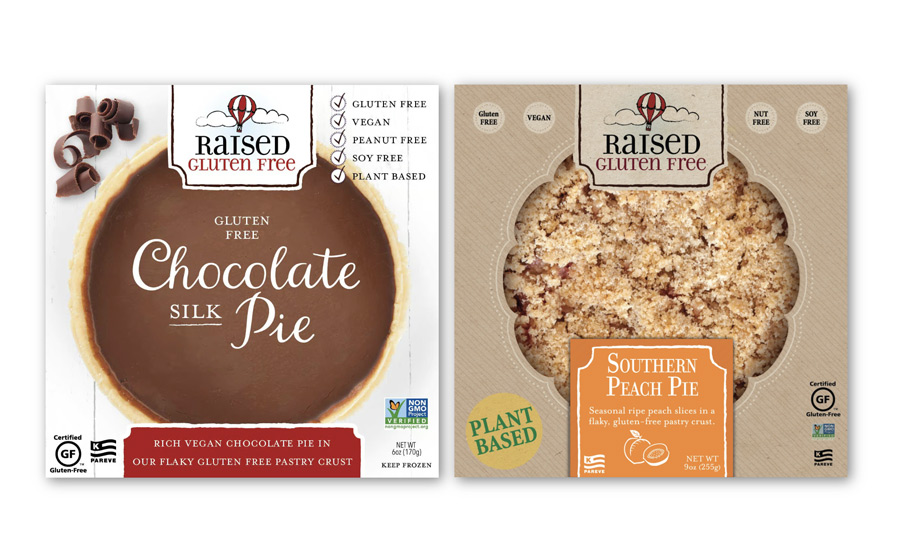
“Desserts are something that we are meant to indulge in and really sink our teeth into, and the category traditionally has seen very little innovation, as quality has deteriorated over the years. Many pies have chewy crusts and a slurry filling full of preservatives with little-to-no fruit integrity. No wonder sales have slipped!” he exclaims. “Our products buck that trend, and we’ve seen sales skyrocket as customers are looking for a pie that reminds them of what grandma used to make.”
Consumer trends that the brand follows include:
- Butter: There is a lot of distrust in a variety of fats and oils, and giving customers a traditional and tasty fat that is easy to pronounce speaks to the quality of what they’re eating, says Martin.
- Cobblers: In 2023, the cobbler category was up 30% over the previous year, and is historically an overlooked product.
- Holiday offerings: Customers look for a rotating variety of flavors as the seasons change, and the one season that dominates all the others are holidays, with pumpkin being king. This year, Willamette Valley is introducing a Pumpkin Cobbler which includes brown sugar and pecans to complement the traditional spiced pumpkin flavor.
- One size does not fit all: Some homes look for a large pie with leftovers that can be had for breakfast or lunch the next day, while others are looking for a smaller option. A tiered pie program in bakery sets is necessary to hit the wide range of consumers that walk through the door.
Martin says that the company strongly leans on data to help guide its future decisions, but also incorporates conversations with customers, and looks back at historical recipes that will bring a sense nostalgia to its desserts.
“Data plays a key part [in consumer trends], but you have to be willing to trust your instinct and go out on a limb and lead. Very few manufacturers are willing to do that,” he notes.
New products
Martin comments that Willamette Valley is innovating with its Marionberry Pie.
“[We are] changing it from a traditional two-crust pie into a lattice top—weaving the strips rather than stamping it out for a high quality look—so customers can see the fruit (and quality) inside the pie,” he explains.
The company also recently released its Pumpkin Cobbler, as mentioned above, and 8-inch pies, such as apple, marionberry, cherry, strawberry rhubarb, peach, and other flavors.
Doherty says that the Edwards brand is looking forward to continuing its partnership with “America's Biggest Pie Lover,” actor Jason Biggs.
“We aim to unite and bring together America's pie lovers for anniversaries, holidays, and any celebration, big or small. This year, the Edwards brand is excited to introduce innovations to the frozen dessert aisle in both the Edwards Signature Cheesecake line and Edwards 2-Slice packs,” he adds.
Venn comments that Tippin’s recently launched a new line of “Celebration Pies” based on its best-selling Silk cream pies.
“These pies feature inclusions and flavorings to attract those who are fond of age-old, nostalgic tastes. For example, we have a confetti birthday cake pie, chocolate chip cookie dough pie, chocolate malt pie, orange dream pie, and grasshopper pie,” he notes.
“We continue to focus on our Heartland Pies brand, which is our private label line of 8-inch pies, and the 6-inch pie size. Both offerings are intended to have lower price points, as well as reduced size of offerings, to minimize waste and accommodate smaller households,” Venn explains.
Tippin’s also has a new line of chess pies and custard pies in final stages of R&D, and they should be available by summer, she adds.
Dixon says that Raised Gluten Free’s newest product is its Southern Peach Pie, which is “a modern take on an old-fashioned favorite.”
“It starts with a delicate, flaky pastry crust and is filled with a mix of juicy peaches and brown sugar and topped with a classic crumble. Like all of our small-batch, artisan desserts, the product is 100% vegan and certified gluten-free, and crafted from high-quality, carefully selected ingredients. It’s also free of dairy, eggs, soy, nuts, peanuts, [and is] Kosher Pareve and Non-GMO Project Verified.”

